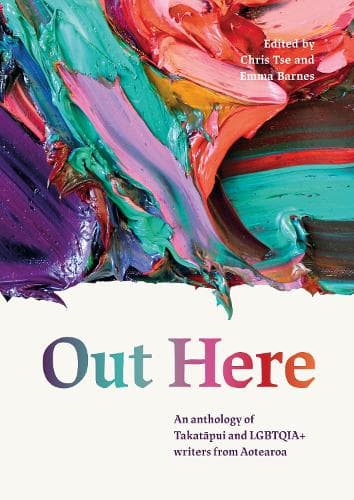Review: Out Here: An Anthology of Takatāpui and LGBTQIA+ writers from Aotearoa
Reviewed by Demi Cox
Reviewing a book like this comes with a tremendous amount of responsibility. The book feels heavy in your hands, though it is not the kind of heaviness that feels burdensome. Rather, the book feels alive – with a pulse, a heartbeat – and it requires a response that ought to do it justice.
However, it is insanely difficult to articulate just how amazing this publication is – without fear or anxiety of doing a bad job – as well as finding an appropriate starting point so as to capture what it achieves as a whole. The question is – where do I start?
I guess, by way of an introduction, we can look to the artwork that adorns the beautiful publication Out Here: An Anthology of Takatāpui and LGBTQIA+ writers from Aotearoa. There is much to be said about book cover design and this publication’s cover image brings to mind an expression, although cliché: a picture speaks a thousand words.
And who would have thought that such a cover could evoke a whirlwind of emotions just by touching it, for the cover feels like canvas. Thick brush stokes of purple, pink, orange and teal whirl across the top half of the cover. Each brush stroke is unique, with the colours overlapping and appearing to be in movement, like waves. Some move right and left, pushing front and back, up and down, and all at once you sense a determination to spill over a margin – one that separates the beautifully chaotic top half from the bottom, which is blank like a white canvas aside from the imprint of the book’s title Out Here, the letters of which echo the colours above.
The words stand tall and bold against the white background, as if proud of their work, and it is the key words beneath the title that signal what Out Here refers to: Takatāpui and LGBTQIA+ writers from Aotearoa. Not just words, of course, but names and nouns, proper nouns, something that exists – perhaps that is where the heartbeat comes from.
When I think of the book’s heaviness I also think of skin and it is perhaps no coincidence that the cover and book design by Kalee Jackson features a detail from the New Zealand artist Jack Trolove’s piece titled, The Thick Skin of a Pronoun. Now, my intention is not to discuss pronouns as such, but the cover does bring to mind a recent Instagram post by the internationally renowned gender non-conforming artist Alok Vaid-Menon, who shared these words in honour of trans awareness month:
A pronoun is a word we use to stand in for a noun. A noun is a thing. Something that emphatically and unequivocally exists.
My mention of Vaid-Menon may appear to stray from the publication but I believe it illustrates an experience I had upon receiving a copy of Out Here. There was familiarity and non-familiarity in the words Takatāpui, LGBTQIA+, writers, and Aoteaora. My mind gravitated towards the words in isolation but struggled to imagine them together…Takatāpui, LGBTQIA+ writers from Aotearoa? Who are they, I tried to imagine, and my mind settled on a few names, but nowhere near as many as the ones that appear in this anthology, which perhaps reveals an ignorance of my own, myself and those around me. It is here that I began to realise just how needed this publication is, although we have all known this to be true.
Perhaps ignorance is not necessarily something to be ashamed of, as such, but something that is surprisingly refreshing, which is a sentiment I suspect many will feel upon reading this anthology, and also appears to be something that the editors themselves experienced.
Chris Tse and Emma Barnes did not set out to know all the writers that appear in this collection but they did have a core goal: to curate something where there is need; an anthology of writers that extends beyond the binary of gay and lesbian that has previously been the extent of visibility in Aotearoa. They have included as many sexual and gender identities as possible, honouring Takatāpui and all the letters of LGBTQIA+, which is not a “mouthful” but a reflection of Aotearoa’s rainbow community.
The editors have achieved this in such a way that is beautifully queer and that is through collaboration. Tse and Barnes sent out a call for submissions and the response was delightfully overwhelming. They received entries from more than 200 writers, of whom only about 30 percent were on their radar.
If ignorance has any place in the context of this anthology, it is also where the editors have done exceptionally well to shift it. They have carefully selected work by writers to illustrate that queerness is diverse and not limited to just coming out or even tragedy. As we ourselves know, there is more to us than the surface level of our identities and the narratives that have been written by other people.
Queerness provides space for other identities to emerge and come out, such as disability, which the anthology wonderfully includes in a way that felt affirming for someone like me. I can only imagine how other readers will feel when they see elements of themselves among the works present, which transcend all genres in the queerest way possible to ensure no one is left behind.
Out Here is thoughtful, delicate and refreshing. There will be names you know and do not know, but you will close the book feeling enlightened and present. No doubt more is to come, for it proves that we have a future and place among the literary scene of Aotearoa. So count yourself included.
Reviewed by Demi Cox
